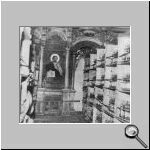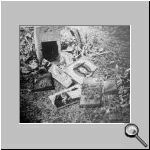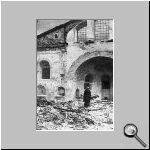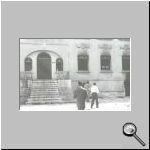|
The Hellenic Genocide
Quotes from historical documents and related Photos. |
|||
CHAPTER XXV: "It is to be noted that neither the French nor the Italians permitted the Greek navy to search the ships of their nationals proceeding to Turkish ports, which is in itself a breach of neutrality and can have but one interpretation—that they were carrying arms and supplies to the Khemalists, with the consent and protection of their governments. For these reasons the battle-ships of the brave and chivalric French, "Protectors of the Christians in the Orient," were obliged to sit quietly among the dead bodies floating in the Bay of Smyrna and watch the massacre going on." CHAPTER XXV: "The following typical incident illustrates the perfect harmony prevailing in naval circles in the Harbor of Smyrna resulting from international discords and how punctiliously the amenities were observed: An admiral of a battle-ship had been invited to dine with one of his colleagues. He arrived some minutes late and apologized for the delay, which had been caused by the dead body of a woman getting tangled up in the propeller of his launch." CHAPTER XXV: ""I am not conjecturing. The trend of the French press, inspired by the government, leaves no room for doubt as to what is prompting France to send arms and money to Khemal Pasha." "During the war one of the telling indictments against Germany was her friendship for and alliance with Turkey when the Armenians were being massacred. Germany was held responsible for the massacres on the ground that she could have stopped them had she used her influence with her ally. This was true; but is it not equally true now that France must bear the opprobrium and in a measure the responsibility, of the Armenian and Greek massacres of 1920 and 1921? A French general negotiated with the Nationalists in Cilicia without stipulating, that the massacres should cease. French diplomats have negotiated with the Angora Government of Khemal Pasha, conniving at the massacres of Armenians and Greeks. The sole thought of the Germans during the war was to use the Turks and not run any risk of offending them by protesting against the massacres. This is exactly what the French are doing now."" CHAPTER XXV: "On April 10, 1920, the Khemalmts treacherously massacred the French garrison at Urfa, killing one hundred and ninety men and wounding about one hundred more, and on October 20, 1921, Franklin Bouillon, in the name of the French Republic signed a separate treaty with the Turks. Immediately after the burning of Smyrna he rushed to the still-smoking city and, seizing Mustapha Khemal in his arms, kissed him. This kiss of Franklin Bouillon has become historic, and while bearing no resemblance to a certain other famous and sinister caress, deserves to rank with it as one of the two most famous kisses in sacred and profane history." CHAPTER XXVI: "The part played by Italy and France, which so greatly contributed to the extermination of the Christian population of Turkey, and the fearful events at Smyrna, are well summed up by George Abbott in the work above referred to, in the following words: "France, who since the Armistice had displayed a keen jealousy of England’s place in a part of the world in which she claims special rights, presently concluded a separate agreement with Turkey—an example in which she was followed by Italy—and gave the Turks her moral and material support against the Greeks; while England, while refusing to reverse her policy in favor of their enemies, contented herself with giving the Greeks only a Platonic encouragement, which they were unwise enough to take for more than it was worth."" CHAPTER XXVII: "At any rate, the British contribution to the Smyrna horror did not consist in active aid of the Turks, neither did she furnish them with arms or munitions. But, though she was largely responsible for the landing of the Greeks in Asia Minor, and the latter were defending her interests, she afforded them no aid, but gave them fallacious encouragement, which led them to their doom. As far as England was concerned, Greece was the victim of British internal politics, which seized upon the government’s policy in the Near East as an object for attack. If Lloyd George was pro-Greek, his political opponents became—ipso facto—rabid pro-Turk." CHAPTER XXVIII: "OF OUR American responsibility for the destruction of the Christians of the Near East, I write with great hesitation and sorrow and must confine myself to the statement of certain universally known facts. The days and months leading up to the fearful events at Smyrna were noisy with the Chester concession and pro-Turk propaganda. The enthusiastic pro-Turk articles in the press of the two Chesters—father and son—are still fresh in the public memory. Other pro-Turk and anti-Christian writers were busy, some among them doubtless earning their daily bread. The Turks were in funds. They had been busy picking the bones of the Christians and had laid their hands on great sums." The Hellenic Genocide Quotes from historical documents and related Photos. Previous page | Initial page | Site Map | Next page (27th of 29) |

The church of Taxiarchis turned into a liquor storehouse.

An Hellenic Chapel in Imvros, vandalized by the Turks.

Patriarch Athenagoras I in front of a burnt Church.

Destroyed Church of Evangelistrias.

The Church of Evangelistrias.

The destroyed hall of the Church of Evangelistrias.

The destroyed office of the Church of Evangelistrias.

Destruction of the Church of Virgin Mary.

The interior of a destroyed church.

The burnt reception hall of the Church of Zoodochos.